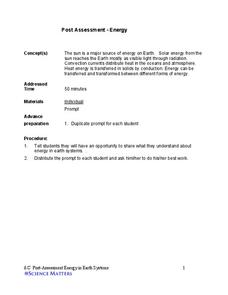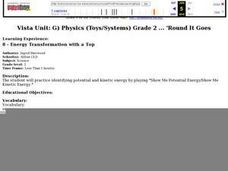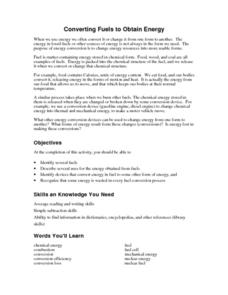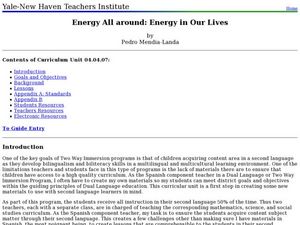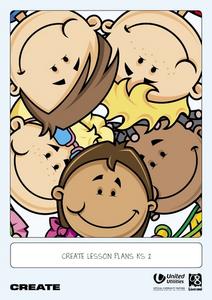Curated OER
Energy
In this energy worksheet, students will complete a graphic organizer by filling in the 2 types of energy waves, 6 forms of energy, and 3 ways thermal energy is transferred.
Science Matters
Energy Transfer and Transformation
When you take a simple task and create an exceptionally difficult way to complete it, it is known as a Rube Goldberg machine. These machines are filled with many types of energy transfers and energy transformations. Here, pupils watch...
Science Matters
Post-Assessment Energy
After nine lessons and activities about energy, here is the final assessment. The 20-questions include multiple choice, multiple choice with justification, short answer, answer analysis, and labeling diagrams to challenge learners.
Curated OER
Bond Energies
Before completing this learning exercise, chemists are supposed read a portion of their textbook. Assign the chapter on bond energies, endothermic, and exothermic reactions. Then have your class answer the questions and fill in the data...
LABScI
Potential and Kinetic Energy: The Roller Coaster Lab
Ron Toomer, a famous roller coaster designer, suffered from motion sickness. Pupils design their own roller coasters, learning about potential and kinetic energy in the process. Labs focus on the importance of drop height, energy...
Kenan Fellows
How Much Energy Is That Anyway?
The fifth lesson in the six part series introduces units of energy including calories, Calories, and joules. Scholars determine the energy released when eating a snack and during activity.
WE Charity
High School–Module 4: Energy and Housing
What features make a home energy-efficient? Pupils attempt to answer the question with the fourth lesson from the five-part WE Are Innovators—High School Modules set. Scholars learn how certain building materials help save energy. Using...
Curated OER
Forms of Energy
In this energy worksheet, students complete a graphic organizer by writing in the different forms of energy and a description of each form of energy.
Curated OER
Conservation of Energy
The 4-stroke engine is the first example of this Power Point. Other examples include skating and a demolition machine. The potential energy and work involved that is then converted to another form, is presented in slides that are...
Curated OER
Energy Transformation with a Top
Second graders examine both potential and kinetic energy. After discussing the difference and examples of potential and kinetic energy, they participate in a game of "Show Me Potential Energy/Show Me Kinetic Energy" using toy tops.
Curated OER
Converting Fuels to Obtain Energy
Students experiment with converting fuels to energy. They also must identify different types of fuels and ways to conserve energy.
Curated OER
Energy Transformation with Balance Toys
Students explore and identify the concepts of potential and kinetic energy. They define kinetic and potential energy and discuss examples of each. Students then play a game involving balance toys, demonstrating both kinetic and potential...
Curated OER
Energy Transformation with Simple Machines
First graders identify both potential and kinetic energy in a game they play in the classroom. They listen as the teacher explains the difference between potential and kinetic energy when observing a simple machine. Using simple...
Curated OER
Energy Crossword Puzzle
For this energy crossword worksheet, students read 36 clues pertaining to energy conservation. Students fit their answers in a crossword puzzle. There is no word bank.
Curated OER
Waste Watchers
Learners recognize the importance of saving energy to save natural resources. For this saving energy lesson, students complete a worksheet to find types of electricity meters in their homes. Learners use meter readings to calculate...
Curated OER
Energy All Around: Energy in Our Lives
Students identify the different sources of energy. In this energy instructional activity, students list different machines and identify the type of energy used to operate them. They create a diagram of a wind turbine and label its parts.
Serendip
How Do Muscles Get the Energy They Need for Athletic Activity?
Every muscle movement requires energy, but where does that energy come from? Scholars answer this question and more as they complete a worksheet. By following the directions, completing research, and discussing it as a class, they begin...
Curated OER
Energy: The Universal Currency
Science stars examine the concept of energy by thinking about everyday situations. The lesson plan is incohesive. It lists goals for the student, but doesn't address all of them in the content. The best use of this resource would simply...
Curated OER
Saving Energy And Climate Change
Learners engage in a lesson that is focused upon the concepts of energy and its relationship to climate change. They focus upon the production of greenhouse gases and global warming. Students discuss the climate of different parts of the...
Carnegie Mellon University
Hydroelectricity
Use a simple PowerPoint presentation to introduce you environmental studies class to hydropower. Hold a debate about the pros and cons of developing this form of alternative energy. Power up your class with this simple lesson on a topic...
Curated OER
What is Energy?
Youngsters take a look at the foods they eat, and how they provide energy for them to do things. They look at how body uses the food energy to create movement. Pupils also look at toys/devices in the room that need electrical energy...
Curated OER
Exploring a Teaching Career Through an Energy Lesson
Students design their own energy conservation lesson plan to teach elementary school students. They use this lesson to determine if they would like to pursue a teaching career
Curated OER
Unit 1 Matter and Energy
Topping this worksheet is a comprehensive collection of notes about phase changes. The phase change graph is displayed, along with formulas for the gas laws, and information relating energy to change of phase. After reviewing these...
Curated OER
Applied Science - Built Environment Post Lab (Energy)
Students study science. In this efficiency lesson plan, students explore different forms of energy and compare them to determine which works the best. They work independently to create a collage of different energy sources (using...




